02/20/2020
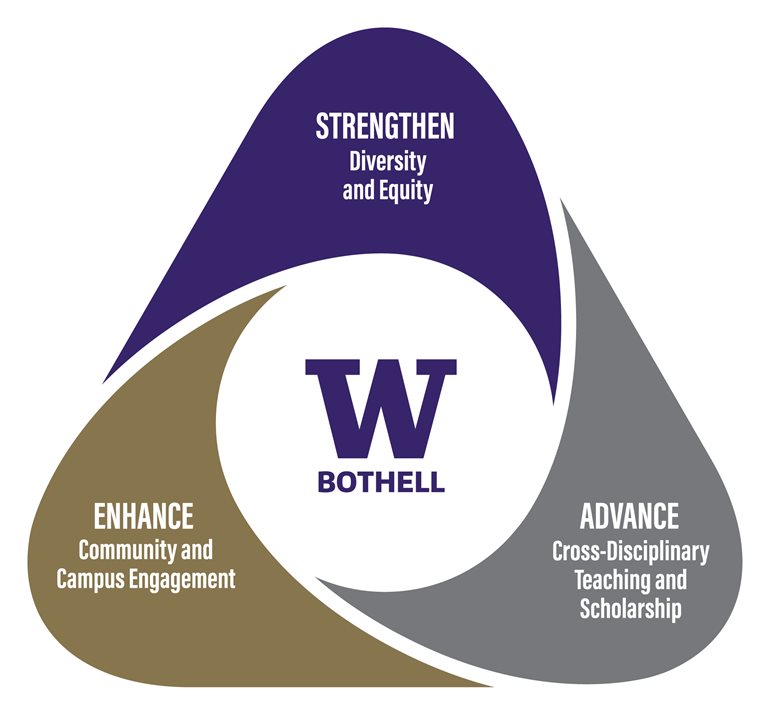
The University of Washington Bothell’s 30th anniversary this year also marks the successful completion of its 21st Century Campus Initiative that launched in 2008. It’s been a period of strong growth that now will continue under a new strategic plan focused on expanding access to a University of Washington education and supporting excellence and achievement.
The plan was drafted with contributions from across the UW Bothell community: students, faculty, staff, alumni, community partners and other stakeholders. It sets three strategic priorities:
- Strengthen diversity and equity
- Enhance community and campus engagement
- Advance cross-disciplinary teaching and scholarship
The new strategic plan was announced officially Feb. 19 at the North Creek Events Center where more than 150 people gathered to learn about the plan and to engage in discussion about how they can participate in its implementation.
Driven by mission and vision
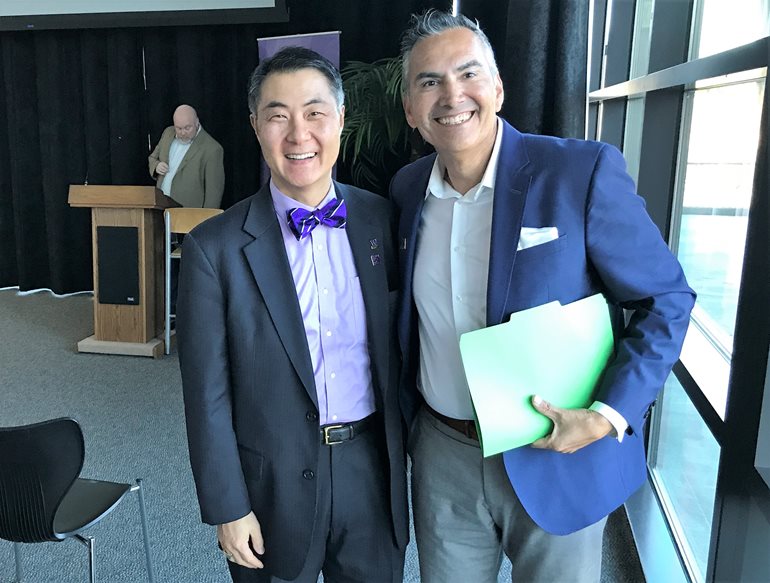
The three priorities create a framework that will guide the work of UW Bothell’s five schools and other academic and support units across campus, said Chancellor Wolf Yeigh.
“This new strategic plan — called Expanding Access, Achieving Excellence — will help us build on the momentum of the 21st Century Campus Initiative.”
As with the initiative, the new plan also builds on UW Bothell’s mission statement, vision and core values, the chancellor noted.
“As we look to the future,” he said, “UW Bothell will continue to be known for offering a diverse student population greater access to an excellent UW education — an educational experience that moves across multiple disciplines, connects with partners in the region and prepares our students to be leaders in their families, communities and careers.”
To assist in the plan’s implementation, Yeigh also announced, a substantive portion of the UW Bothell Investment Fund will be earmarked over the next six years to support projects that advance the three priorities.
Priorities are pillars
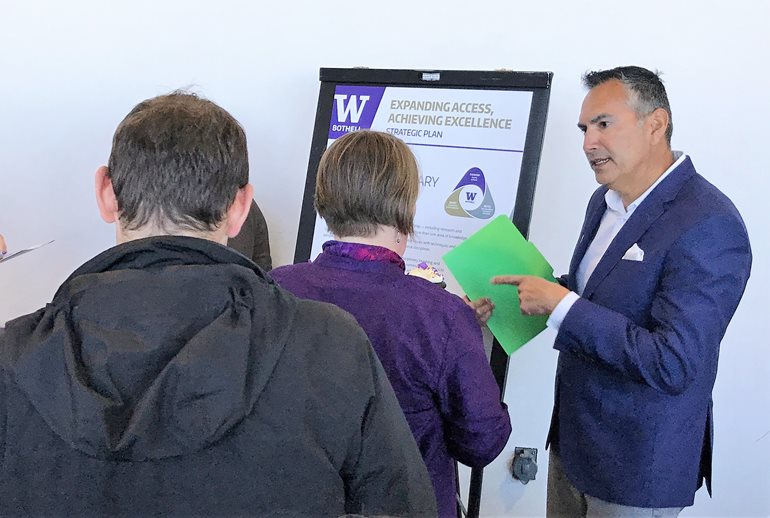
The planning process was led by a Strategic Planning Team co-chaired by Ed Buendia, the dean of the School of Educational Studies; and Ruth A. Johnston, who was vice chancellor for Planning & Administration when the project started.
Creation of the new plan took two and a half years, with a year of preparation and data gathering followed by more than a year for community input and then feedback on drafts. The planning team also brought in a consultant to help organize and refine all the data and ideas.
This process was designed to ensure that the final plan reflects UW Bothell’s current strengths while at the same time identifying areas to move forward with more concerted effort, Buendia said.
For example, cross-disciplinary teaching and scholarship has long been a featured practice (as one of the “three Cs,” along with connected learning and community engagement). Now, he said, the University can advance cross-disciplinarity by better aligning units and resources on a new scale.
Buendia said it also makes sense that UW Bothell’s new strategic plan aims to strengthen diversity and equity. “Access to excellence is predicated upon an inclusive, supportive campus community. We’re making sure we’re aligning our resources and culture to those values,” he said.
The community engagement element of the strategic plan highlights another value, Buendia said. “The DNA of the Bothell campus is one of partnered education.”
Along with that, the plan also emphasizes the value of campus engagement to foster collaboration internally, he said.
“Campus engagement is the way we create a culture of learning and respect and reciprocity,” Buendia said. “Importantly, we are explicitly calling out the significance of internal partnerships and learning from each other.”
Campus community project
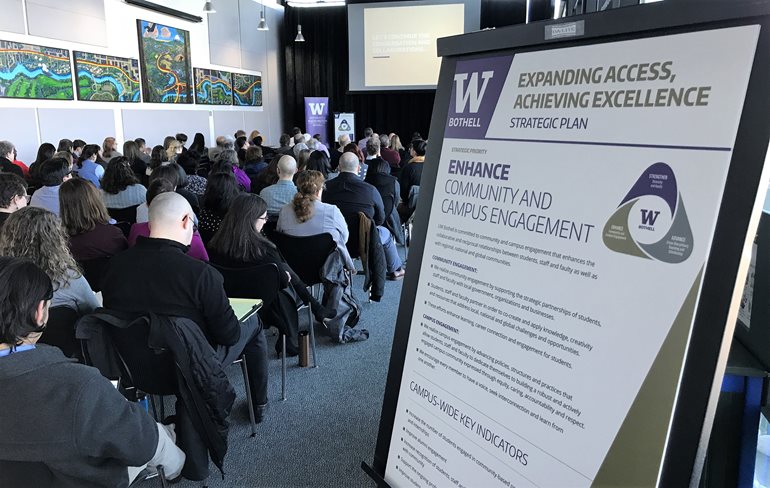
Buendia called the completion of the new strategic plan a celebration of community.
“We were thrilled that people leaned into the activities and were highly invested in making sure we were leveraging the identity and assets of our campus,” he said. “Ownership really lies expansively with our stakeholders, campus faculty, staff and students.”
In his remarks at the unveiling event, Yeigh praised the breadth of contributions solicited during the planning process, which incorporated suggestions and viewpoints culled from open forums, workshops and surveys.
“I would like to thank everyone who contributed their ideas and insights to this new plan,” he said. “I know hundreds of people across campus and beyond participated in drafting and reviewing the strategies that will now guide our work in coming years.
“Without your participation, we would not have this framework to the future,” he said. “And with your active engagement, I know we will achieve our goals for a better UW Bothell.”
Organizational values
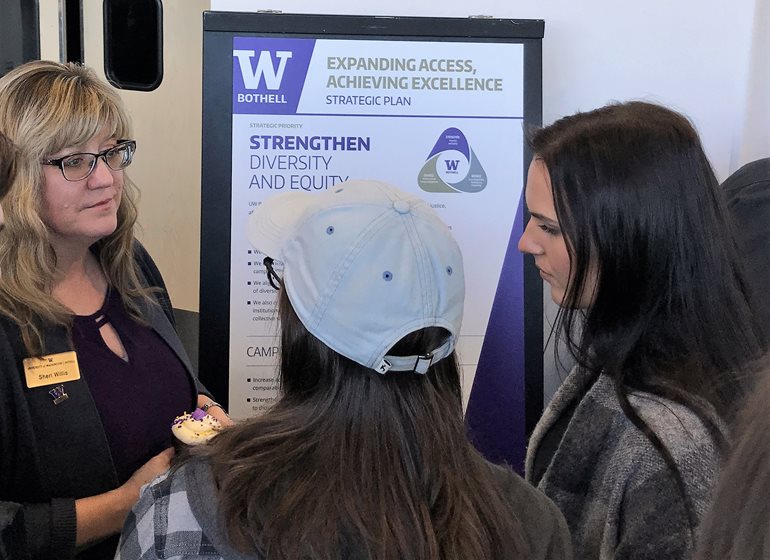
Campus engagement is a critical part of the plan — and the plan’s successful implementation, said Sheri Willis, an organizational development specialist who served as a project manager and facilitator during the final stages of the planning process.
“I see community as all of us. We’re talking about all faculty and staff who are supporting student success and helping deliver educational needs,” she said. “It was important for that to be part of the plan. We want to enhance and build on that.”
Going forward, Willis said, all three priorities identified in the plan present an opportunity to align efforts that cross the campus and bring synergy to work in various schools or other units.
“This is a point in our development for us to create more discipline around what we want to focus on and the impact we want to have in the world,” Willis said. “This is about all of us — staff, faculty, students and our community partnerships and those we have yet to build.”
The plan puts these priorities in the forefront, she said.
“A lot of folks are already doing great work. It’s about being more aware of how our daily work connects so we can see it,” she said. “Taking a moment to look at the big picture opens up the opportunity to see other things we could be doing.”
Focus on the future
Buendia said the campus faces multiple options and choices in coming years.
“The strategic plan is a way for us to appraise those opportunities and keep our eyes focused on what is important to student learning, faculty and staff learning, and the health of the community as a whole,” he said.
“Our promise with the plan is to ensure our programming is going to reflect these particular priorities.”



